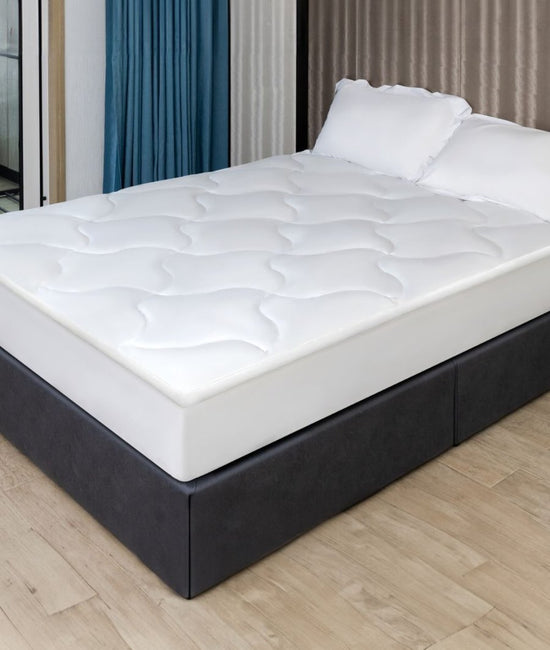Fall Allergies and Cooler Nights: How Autumn Affects Your Sleep and What to Do About It
As fall sets in, bringing crisp air, colorful leaves, and shorter days, our bodies adjust to the seasonal shift in ways we might not even realize. The changing weather and environmental conditions can impact how well we sleep. From the cooler nighttime temperatures to the rise in allergens, autumn presents unique challenges to restful sleep.
Here’s a look at how the fall season affects sleep and some simple solutions to help you rest easy as the seasons change.
Fall Allergies and Your Sleep
While spring is notorious for allergies, fall can be just as troublesome. Allergens like ragweed and mold spores peak in autumn, triggering sneezing, congestion, and itchy eyes in allergy sufferers. According to the American College of Allergy, Asthma & Immunology (ACAAI), around 75% of people allergic to spring plants also react to ragweed, which is most prominent in the fall.

For those sensitive to mold, the fallen leaves of autumn can be a breeding ground. As leaves decompose, mold spores are released into the air, leading to allergic reactions that can disrupt sleep.
Solution: To reduce the impact of allergies on your sleep, consider using a high-efficiency air purifier in your bedroom to filter out allergens. Additionally, washing bedding weekly in hot water can help reduce dust mites and pollen particles.
The Temperature Shift: Cooler Nights for Better Rest
As fall arrives, the drop in nighttime temperatures is actually beneficial for sleep. Studies show that cooler room temperatures promote deeper, more restful sleep by helping the body naturally drop its core temperature, which is essential for initiating sleep. The ideal bedroom temperature for optimal sleep is around 65°F (18°C), according to the National Sleep Foundation.

However, as temperatures fluctuate in early fall, it can be tricky to maintain a consistent, comfortable sleeping environment.
Solution: To adapt to the temperature changes, use breathable bedding that allows for temperature regulation, such as Sweet Zzz’s bamboo sheets. You may also want to keep a cozy blanket nearby for those nights when the temperature drops a bit more than expected, but keep your room comfortably cool to optimize your sleep.
Adjusting to Less Daylight
With shorter days, the amount of natural light we’re exposed to decreases, impacting our circadian rhythm, or internal body clock. Reduced exposure to natural light, particularly in the morning, can lead to decreased melatonin production during the day, which makes us feel tired earlier in the evening. This can cause a phenomenon known as “social jetlag,” where our internal clocks become misaligned with social or work schedules.

Solution: Try to get outside during daylight hours, especially in the morning. Exposure to natural light helps regulate your circadian rhythm by signaling your brain to reduce melatonin production, promoting alertness during the day. If getting outdoors isn’t possible, consider a light therapy box to mimic natural sunlight and help adjust your internal clock.
Humidity Levels and Respiratory Comfort
As fall temperatures drop, indoor humidity levels tend to decrease as well. Low humidity can dry out nasal passages, making breathing more uncomfortable, especially during sleep. According to the Mayo Clinic, dry air can irritate the respiratory system and worsen conditions like asthma or allergies.

Solution: To keep indoor air at a comfortable humidity level (between 30% and 50%), consider using a humidifier in your bedroom. This can help keep nasal passages moist, making it easier to breathe and reducing the likelihood of waking up with a dry throat or congested sinuses.
Embracing the Season with a Cozy Sleep Environment
Autumn is the perfect time to make your bedroom feel like a cozy retreat. Switching to warmer hues, adding layers, and even bringing in relaxing fall scents can make your sleep environment feel more inviting. Creating a sleep space that feels comforting can signal to your brain that it’s time to wind down.
A mattress that supports temperature regulation and comfort is essential as well. The Honey Hybrid Organic Mattress by Sweet Zzz provides both, with natural materials that adapt to your body and regulate heat, allowing you to stay cozy without overheating. A supportive mattress can help keep you comfortable all night long, enhancing the quality of your sleep in any season.
Final Thoughts
Fall brings plenty of reasons to celebrate, from scenic landscapes to cooler weather. But it also presents unique challenges for sleep, with allergens, temperature changes, and shorter days impacting rest. By making small adjustments to your sleep environment and embracing the cozy vibes of fall, you can enjoy better rest as the seasons change. Here’s to a season of comfort, coziness, and restful nights!








